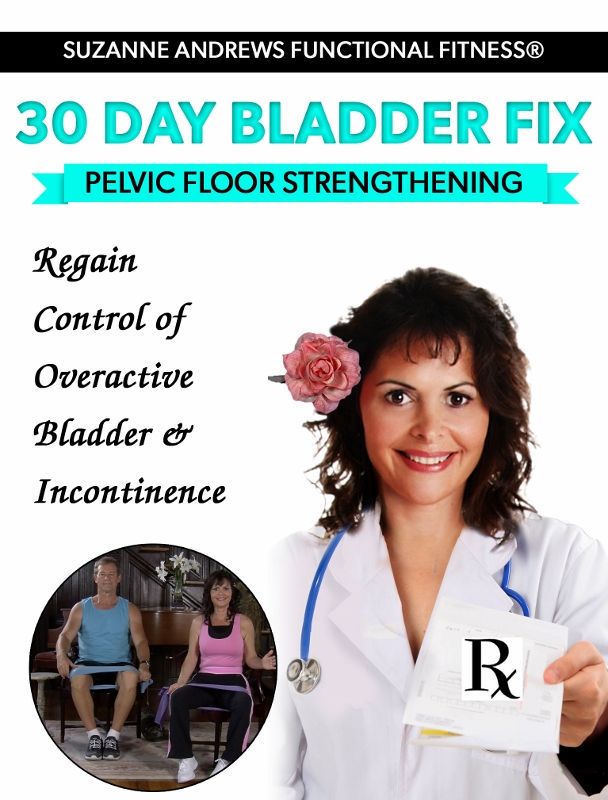by Suzanne Andrews

One surprising aspect of practicing fitness after 50 is how it affects your endocrine system. That's the system of organs in your body that produce and regulates hormones in your bloodstream. Just like a thermostat signals your heating and air conditioning system when to turn on and off, so does your body. If you're going through menopause, you feel how important it is to regulate your hormones every time you get a hot flash. So what can you do besides stripping and throwing a bucket of ice water on you? First, and bear with me, I need to explain how your body works…
The pituitary gland in your brain produces growth hormone (GH) and that production is increased during aerobic exercise. This is vital for muscle tone and bone density and also helps strengthen your tendons, cartilage and ligaments which literally holds you together. So if you're having a mood swing that even chocolate can't fix and someone says, "Get it together," if you exercise, you can proudly claim, "I'm being held together quite nicely, thank you".
Growth hormone also communicates fat deposits to be used as fuel instead of blood glucose which helps you to stay energized longer while exercising, which is also why exercise is vital for people who have diabetes and why it helps to keep your metabolism running smoothly during menopause.
You've probably heard that the longer you exercise, the easier or less painful it gets. The pituitary gland also produces endorphins. This is one of my favorites because it sends a chemical signal to the brain to reduce anxiety, tension, decreases your appetite, blocks pain and gives you sense of euphoria known as "runners high" where you can exercise for longer periods of time with less pain. Now, you don't have to be a runner to experience this. An increased sensitivity to endorphins can be achieved if you've exercised for several months because it winds up staying in your blood for longer periods causing that "runners high" to last longer as well. Good stuff.
Testosterone is produced in both sexes, in the ovaries in women and the testes in men. Women have about one tenth the amounts of men but it still affects your metabolism by burning fat during exercise along with increasing muscle strength and tone, and producing a sense of self confidence. When you're healthy and strong you feel good! Testosterone can remain in your bloodstream at elevated levels up to three hours after exercise. In women it can also benefit the intensity of orgasms and that's never a bad thing.
Here's another reason to exercise. Another hormone that helps to breakdown unwanted body fat is estrogen. It increases your metabolism (burns fat as fuel), increases both your libido and your mood. The ovaries produce less of it as menopause is reached but exercising can elevate its levels in the blood for up to four hours after exercising so you feel sexier and happier. Now that's better than a valium and has much better side effects than any anti-depressant.
The thyroid gland produces thyroxine which again increases your metabolism in nearly all cells in your body. The increase induces a feeling of being more energetic, burns more calories which promotes weight loss. You get about 30% more thyroxine in the blood during exercise and it remains for several hours afterwards. The longer and harder you exercise the longer it flows through the blood even at rest. You can literally be burning fat stores long after exercising.
The adrenal medulla produces epinephrine (adrenaline) whose primary purpose is to signal the heart to pump harder and it also directs blood flow to the muscles being worked using the stored fat in those muscles as fuel/energy. While this chemical is flowing through your bloodstream it also activates the breakdown of carbohydrates (glycogen) in the liver and the active muscles. The higher the time and intensity of exercise the more epinephrine is released into the blood. But more is not always better. If you haven't exercises for a while it's best to start off with a beginner's fat burning program and progress as tolerated to avoid injury.
The human body is an amazing biological machine that isn't programmed so much as it responds to inputs we decide to place upon it. If you sit and eat, it responds by weakening, fattening and sickening. If you exercise and eat nutritious foods; it strengthens, tones and fights illness and disease. You ultimately choose the way your body reacts to the lifestyle you live. Exercising on a regular schedule causes the body to react with chemical signals that strengthen cells, burn fat deposits and increase blood flow to all the organs responsible for better bodily functions and health.
Suzanne Andrews founded Functional Fitness in 2008, the most popular fitness series for boomers and seniors broadcasting on over 159 Public Television stations throughout the US and Canada. Read Suzanne’s inspiring comeback story of how she survived a near fatal accident, From Deaths Door to Producing a National Fitness Series. Feel free to send Suzanne a message here.










